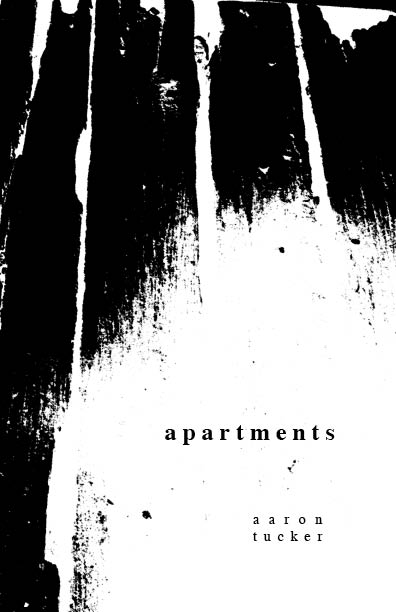Short Listed for the bpNichol Chapbook Award
apartments explores a non narrative poetic discussion of space in the landscape of Toronto, where every inch and foot is contested, every block gridded, every house and building carefully demarked, labeled, defined. The intersection that the work is most concerned with is the crossing of language and architecture. Being in the city means being constantly deluged with words and phrases alongside our buildings. We are swarmed with letters and dialogue whether it be through ads or storefronts, stray stereos or intercoms: the question that the work keeps returning to is where can an individual find space to live and language to express his/herself within a city.
The struggle that emerges is a balancing between the universal and particular. At one instant I am discussing the city as whole, as an organism and how one person’s experience with urbanity can be translated to a universal sentiment. At the same time, in order to create and explore the individual in the city’s space, the text is cut into increasingly smaller and smaller particles: the poems become the city, then the buildings, then the rooms, then the furniture and so on. Likewise language breaks from the line, to the phrase, to the word to the letter and so on.
Ultimately this has manifested in two voices in the poems: first, there are the brief scenes, the intense bundles of character’s experience told through the pronoun of “he” or “she”. These are intended as the “cells” of the work, the individual pockets that make up the larger organs and bodies of the work as a whole. In this way, I aimed to create space for the individual by telling brief scenes and letting each of those poems become a claimed space for that character. Though I don’t intend them to be from one narrative perspective (i.e. the he and she of each poem are different from each other) the vague application of the pronoun allows the reader to connect the poems in a loose arc, creating the sort of unifying identity that comes with living together in a city.
It is also important to note that the “cells” of the work are purposely fragmented on the page. Again, this is an attempt to physical manifest the struggle for space within the poems. By breaking the words apart, the phrases achieve a pseudo scrambling, a breaking from the city-like grid of words from left to right margin. Instead the reader is invite to create the map of the poem, to define the space within the work and piece together the poems.
The second voice is more of a poetic commentary, less narrative and more theoretical on how space and room effects individuals and language. This voice is concerned with explaining (justifying?) the increasing separation and compartmentalizing of space and language that takes place within a city. These are the more “universal” poems, one that struggle with the broader theoretical implications of a city and its space and how that affects language as a community of inhabitants. The language then is slightly elevated, but again, reconstructed in non traditional combinations, intertwining the imagery of the homes or specific sites (e.g. hardwood floors) with discussion of the how I see the city working.
I see these two voices alternating between each other, almost page to page, and providing the reader with the constant tension of the city at large and the individual inhabitant. I did not construct the two voices as polar opposites, but rather as complimentary viewpoints; it is important then to intertwine them instead of sectioning them off.
Pulling heavily from Nathalie Stephens Touch to Affliction, Lisa Robertson’s Office for Soft Architecture and Le Corbusier’s measure of The Modular, the work aims to explore humans, both in body and language, in a city.
Full Manuscript: apartments – Aaron Tucker (Full MS)
apartments II was released as a chapbook by The Emergency Response Unit and was shortlisted for the National bpNichol Chapbook award. You can buy the gorgeously made text at The Emergency Response Unit’s website.
rob mclennan released another chapbok version of the manuscript, apartments III, with his chapbook press above/ground. You can read all sorts of wonderful Canadian poetry musing and reviews at rob’s blog or buy a copy of the work here.

